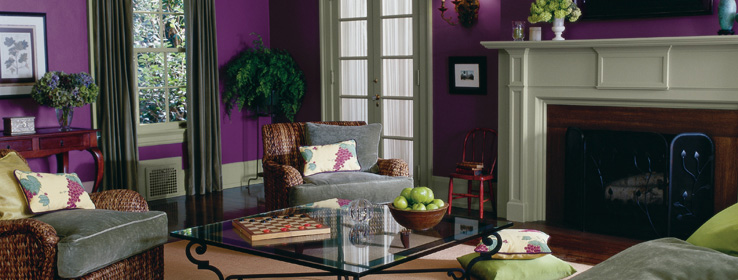Add just the right touch of drama to a room by using pops of color in unusual and unexpected places.
With the New Year can come ambitious plans for fresh starts, grand ideas and great big projects. However, once clients settle back into the routine of daily life, the lofty goals are occasionally reassessed. What started out as "Let's finally redo our downstairs!" becomes, "What can we do to spiff up this space without too much time and effort?" Sometimes, adding a carefully placed splash of color is all it takes to inject the needed energy and character.
Recessed areas
Take a recessed space and make it an architectural feature by highlighting it in an accent color. Alcoves become cozy nooks. Bookshelf backs become artistic backdrops for displaying books and antiques. Otherwise sooty fireplace interiors transform into mini stage settings.
Hidden spaces
Playing hide and seek with colorful accents can be a source of unexpected joy and wonder. Slide open a drawer to discover a fuchsia lining. Open the door to a cheerful tangerine closet. Direct attention to the inside of a front door coated in shiny turquoise. Welcome visitors with a bright, lime green doorstep. And what about less-obvious places, such as the inside of a lampshade? Lined with a contrasting paper, it's a playful surprise when turned on. Door handles and drawer pulls or knobs can also be painted or swapped out for something more dynamic and colorful. Neglected elements and spaces can become charming surprises.
Color blocking
A big, bare wall lacking interest can pack some special as well as spatial punch if you apply color blocking. No headboard? Achieve the same effect by creating a simple silhouette on the wall behind the bed. By adding solid geometric areas of contrasting hues to break up the mass of a wall – or add focus to art and furniture – you achieve instant drama.
Trim
Why must trim always be white? The molding around windows and doors are an excellent opportunity to have some fun with color. And you can extend the fun by painting an additional border around trim to visually expand the size of windows. Update and highlight paneling by painting the insides a contrasting color to the wall color, and add a third color on the molding for depth. Or, try a new color on coving and cornicing.
Ceilings
While on the topic of features near the ceiling, let's not forget the very important "fifth wall." Ceilings are an excellent opportunity to imbue a room with color from subtle to shocking. Your eye is naturally drawn to the area of highest contrast, and stark white ceilings often seem to be neglected. Try a soft shade of sky blue or a brazen crimson. Cove and tray ceilings work especially well for this treatment.
Stairs
Transition spaces are equally overlooked as an opportunity to inject color. Instead of your traditional wood or carpeted stairs, why not paint or paper the risers a contrasting color, or create a painted runner down the center? It's a simple yet high-impact change.
Furniture
Like Cinderella magically becoming a princess for the grand ball, so too can old appliances and furniture receive a new lease on life. An old claw-foot tub can don a coat of primer and a splash of color, while a hand-me-down dresser becomes a family heirloom in a new suit of lacquer.
Like fashion designer Christian Louboutin – who, in determining that his shoes lacked energy, grabbed a bottle of nail polish and added bright red paint to the soles – you can find a myriad of fun, easy and truly inspiring ways to add that unexpected punch of color.
Image provided by and used with the permission of Casapinka.










